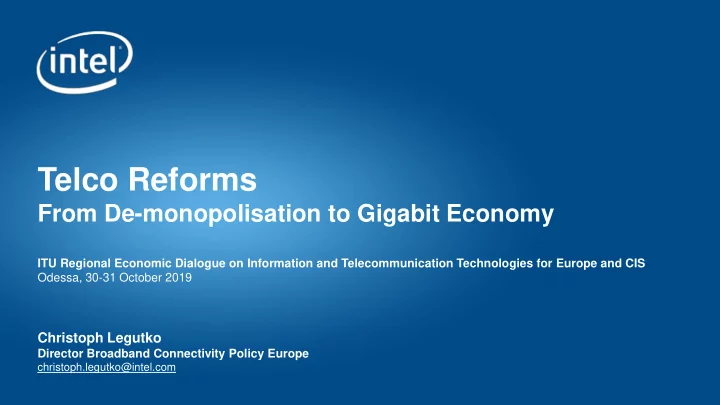

Telco Reforms From De-monopolisation to Gigabit Economy ITU Regional Economic Dialogue on Information and Telecommunication Technologies for Europe and CIS Odessa, 30-31 October 2019 Christoph Legutko Director Broadband Connectivity Policy Europe christoph.legutko@intel.com
Importance of 5G in Europe 5G • 5G will form the future digital backbone of gigabit society and economy • 5G will connect billions of objects and systems, including in critical sectors such as energy, transport, banking, and health, as well as industrial control systems carrying sensitive information and supporting safety systems • 5G is going to unify the mobile and fixed networks as a radio extension of the IP-protocol 5G Spectrum Auctions • 5G spectrum auctions in at least one band in eleven Member States during 2019 : Austria, Belgium, Czech Republic, France, Germany, Greece, Hungary, Ireland, Netherlands, Lithuania, and Portugal. • Six more 5G auctions are scheduled for 2020: Spain, Malta, Lithuania, Slovakia, Poland, and the UK 5G Rollout • EU 5G Action Plan sets the target date of 2020 for commercial launch in all Member States • Rollout is under the responsibility of the Member States and together with operators • Comprehensive roll-out in cities and along major transport paths by 2025 • Europe is a world leader in 5G trial activities with 153 trials in 28 Member States 5G Revenues • 5G revenues should reach the equivalent of €225 billion worldwide in 2025 • Across four key industrial sectors (automotive, health, transport, energy) in EU 5G revenues could reach €114 billion per year 2
EU Telecom Reforms: From De-monopolisation to Gigabit Economy Liberalisation in the telecom sector, launched in the mid 1980s • introduced competition on the existing telephone (twisted pair) and TV (coax cable) copper networks • initialised digitalisation Telecom Framework Review around 2010 introduced technology and service neutrality, opened up broadcasting bands European Electronic Communications Code, approved in December 2018 • supports deployment and take-up of 5G networks • does not reform market structures to attract the investments in the passive infrastructures Incumbent telcos ~2010 Governmental <1990 Gigabit Economy >2025 Analogue Digital Internet Applications & Services Depreciation ~1 year High risk & ROI Applications Applications Transparent financing interface Applications Voice TV/R Video Cellular Reform Enable DSL DOCSIS Broadcast WiFi Active Infrastructure Successful Business Specialised Platforms Platforms Depreciation ~5 years Transport Copper Coax Spectrum Reporting Investors Spectrum Middle risk & ROI Copper Spectrum Copper Transparent financing interface Optical Fibre Optical Fibre Copper Passive Infrastructure Optical Fibre Depreciation ~20 years Low risk & ROI 3
Continue EU Telecom Market Reforms for Gigabit Economy The major milestone achieved as the European politics and incumbent telcos have meanwhile recognised that there will be no 5G without optical fibre networks. The ecosystem is still catch in the complicated/slow subsidies system for FTTB/H rollout and not ready for radical policy change to allow copper by fibre replacements by the private investors. The industrial pressure to deploy optical fibre everywhere is growing because for they need the gigabit data streams transported from/to the clients via 4G/5G outdoor and WiFi indoor before 2025 The OECD study “THE OPERATORS AND THEIR FUTURE, the state of play and emerging business models” (OECD Digital Economy Papers, Sept’19, No. 287) indicates the way towards the businesses models with stable financial performance, long investment horizons, strong free cash flows, incentives to provide upgraded infrastructure as demand arises, and attracting private investors To enable 5G on time (~2025) the communication regulation and policy reforms should be accelerated to make the existing digital communication networks fit for the gigabit economy 4
Resume Continue reforms of European Electronic Communications Code (EECC) keep EECC technology neutral and adaptive to the transforming and converging communication markets make the accounting and business reporting of incumbent telcos transparent to the private investors to attract their investments in ultra-fast networks Questions Welcome !! Thanks for listening !! 5
Recommend
More recommend